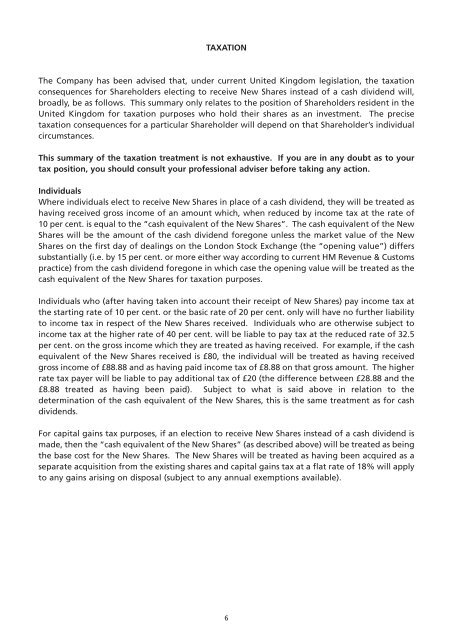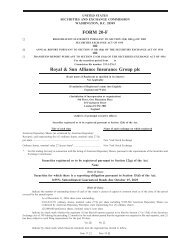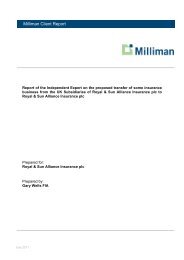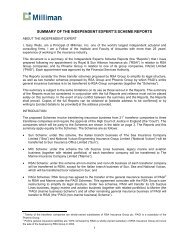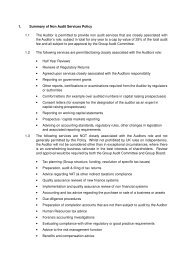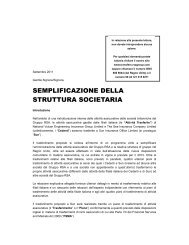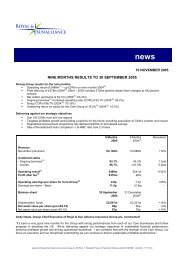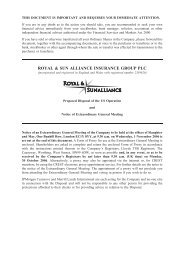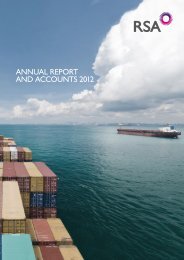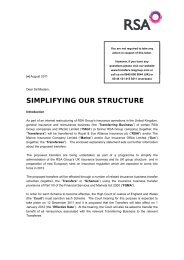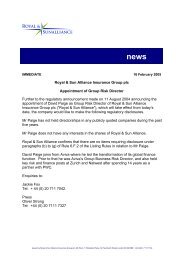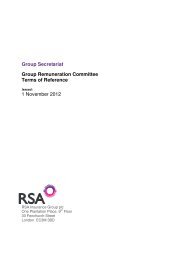Scrip Dividend Scheme
Scrip Dividend Scheme
Scrip Dividend Scheme
You also want an ePaper? Increase the reach of your titles
YUMPU automatically turns print PDFs into web optimized ePapers that Google loves.
TAXATION<br />
The Company has been advised that, under current United Kingdom legislation, the taxation<br />
consequences for Shareholders electing to receive New Shares instead of a cash dividend will,<br />
broadly, be as follows. This summary only relates to the position of Shareholders resident in the<br />
United Kingdom for taxation purposes who hold their shares as an investment. The precise<br />
taxation consequences for a particular Shareholder will depend on that Shareholder’s individual<br />
circumstances.<br />
This summary of the taxation treatment is not exhaustive. If you are in any doubt as to your<br />
tax position, you should consult your professional adviser before taking any action.<br />
Individuals<br />
Where individuals elect to receive New Shares in place of a cash dividend, they will be treated as<br />
having received gross income of an amount which, when reduced by income tax at the rate of<br />
10 per cent. is equal to the “cash equivalent of the New Shares”. The cash equivalent of the New<br />
Shares will be the amount of the cash dividend foregone unless the market value of the New<br />
Shares on the first day of dealings on the London Stock Exchange (the “opening value”) differs<br />
substantially (i.e. by 15 per cent. or more either way according to current HM Revenue & Customs<br />
practice) from the cash dividend foregone in which case the opening value will be treated as the<br />
cash equivalent of the New Shares for taxation purposes.<br />
Individuals who (after having taken into account their receipt of New Shares) pay income tax at<br />
the starting rate of 10 per cent. or the basic rate of 20 per cent. only will have no further liability<br />
to income tax in respect of the New Shares received. Individuals who are otherwise subject to<br />
income tax at the higher rate of 40 per cent. will be liable to pay tax at the reduced rate of 32.5<br />
per cent. on the gross income which they are treated as having received. For example, if the cash<br />
equivalent of the New Shares received is £80, the individual will be treated as having received<br />
gross income of £88.88 and as having paid income tax of £8.88 on that gross amount. The higher<br />
rate tax payer will be liable to pay additional tax of £20 (the difference between £28.88 and the<br />
£8.88 treated as having been paid). Subject to what is said above in relation to the<br />
determination of the cash equivalent of the New Shares, this is the same treatment as for cash<br />
dividends.<br />
For capital gains tax purposes, if an election to receive New Shares instead of a cash dividend is<br />
made, then the “cash equivalent of the New Shares” (as described above) will be treated as being<br />
the base cost for the New Shares. The New Shares will be treated as having been acquired as a<br />
separate acquisition from the existing shares and capital gains tax at a flat rate of 18% will apply<br />
to any gains arising on disposal (subject to any annual exemptions available).<br />
6


